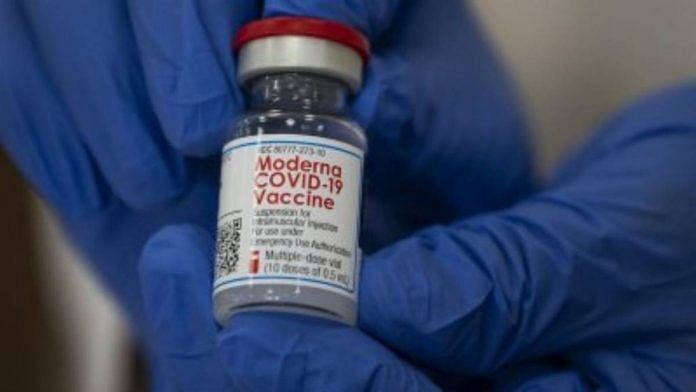New Delhi: Even a quarter dose of Moderna’s Covid-19 vaccine induces a robust immune response that lasts at least six months, revealed a new study that is yet to be peer-reviewed.
The standard dose of the mRNA vaccine is 100 micrograms, however, researchers from the La Jolla Institute for Immunology in the US, inoculated 35 people with 25 micrograms. The study participants received two doses at an interval of 28 days.
The participants of the study were tracked for seven months and their blood samples collected at different intervals.
The researchers found that specific antibodies against the spike protein, which are present on the surface of coronavirus, were detectable six months after both the doses were administered.
They also found that the antibodies generated by the quarter dose vaccine were similar to those found in recovered Covid patients.
The study also looked at the T cell response of the vaccine and found that they were present six months after the shot. T cells are important white blood cells of the immune system that play a central role in shaping the immune response. It also plays a role in immune ‘memory’, which allows the body to recognise a pathogen it has encountered before.
Also read: Daily vaccinations drop in July after a record high in June, Modi govt blames states
Low dose vaccines can aid Covid strategies
While the number of participants in the study was not sufficient to conduct an age-wise analysis of immune responses, researchers found that antibody levels were reduced two-fold in participants over the age of 56.
This, the researchers said, is similar to what has been seen in older adults who received the standard Moderna vaccine doses.
However, T cell levels in the older participants continued to be as strong as those in the 18 to 55 age group.
The researchers said that low-dose RNA vaccines have potential advantages for future needs and applications. For instance, with low dose vaccines a larger number of people can be inoculated that can aid countries struggling with vaccine shortages.
Low-dose immunisation is also less reactogenic as they are likely to cause milder adverse reactions.
Based on their findings, researchers said that policy makers can consider administering different vaccine doses across age groups. Lower doses, for instance, can be given to low-risk populations.
However, since the study was conducted with a small number of people, the team has called for further research into immune memory induced by different doses.
“Data reported here are encouraging demonstrations of the potential of RNA vaccines to generate immune memory, including at lower doses,” the researchers said.
(Edited by Rachel John)
Also read: Flu vaccine could reduce risk of stroke, sepsis, blood clots in Covid patients, study finds



